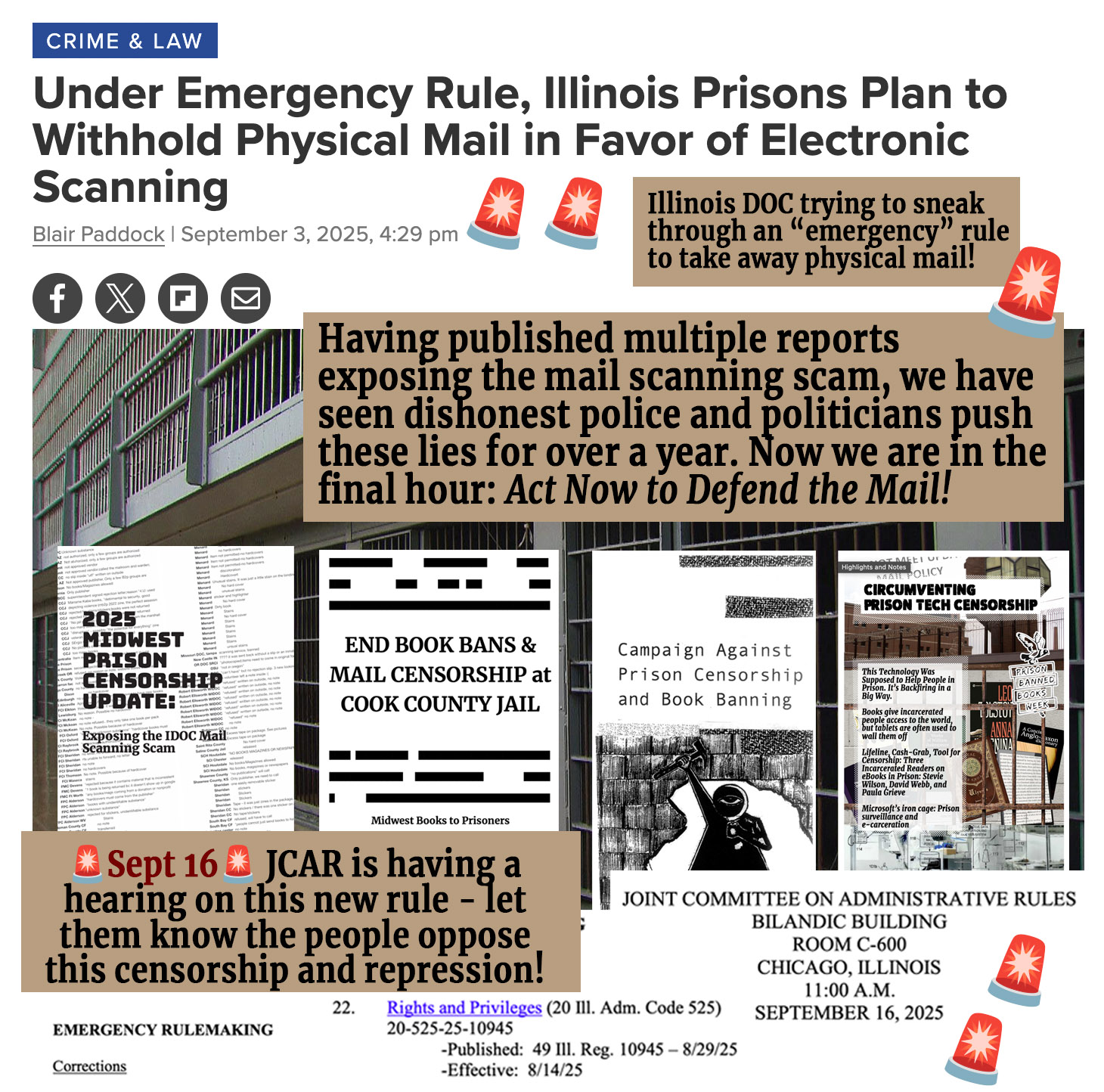
Illinois DOC has quietly proposed “Emergency” amendments permitting them to take away physical mail and implement mail digitization. Having published multiple reports exposing the mail scanning scam, we have seen dishonest police and politicians push these lies for over a year. Now we are in the final hour: act now to defend the mail! Read the joint letter below signed by over 56 organizations.
The Illinois Joint Committee on Administrative Rules is meeting September 16th and this Emergency Amendment is on the agenda. Insultingly, public comment isn’t allowed, but people are allowed to be present – we’re encouraging people come out to make public opposition known.
Joint Committee on Administrative Rules
c/o Executive Director Kim Schultz
700 Stratton Office Building
Springfield, Illinois 62706September 9, 2025
Re: Opposition and Concerns Regarding IDOC Emergency Amendments – 20 Ill. Adm. Code 525 (Mail & Publications)
Dear Members of the Joint Committee on Administrative Rules and Executive Director Schultz:
We, the undersigned community, legal, and policy organizations, write to you, on behalf of our members, to express serious concerns with the Illinois Department of Corrections’ (IDOC) recent emergency amendments to Part 525 of Title 20 of the Illinois Administrative Code, adopted August 14, 2025 (49 Ill. Reg. 10945). These rules, which significantly alter the processing of mail and publications for people who are incarcerated, were promulgated without stakeholder input and raise procedural, operational, religious, and equity concerns.
While we recognize IDOC’s obligation to protect the safety and security of its facilities, we strongly question whether these amendments meet the statutory standard for emergency rulemaking under the Illinois Administrative Procedure Act. There have been discussions for more than a year regarding how contraband enters state correctional facilities, yet IDOC has taken no action until now. Given IDOC’s stated “Reason for Emergency” in the rulemaking, it is important to note that IDOC has never furnished data or evidence, either to the General Assembly or to the public, demonstrating how illicit substances enter its facilities. Public Act 104-0412, recently signed by the Governor, will provide much-needed data on what contraband is entering facilities and how it is getting into prisons. Resorting to emergency rulemaking in this context before this data can be collected and publicly shared appears to be an attempt to bypass the public notice-and-comment process and avoid engagement with the legal, religious, educational, advocacy, and loved ones communities most impacted.
In addition to the utilization of emergency rule-making, we are deeply concerned about the substance of the emergency rules. First, the rules provide no pathway for original mail to eventually be delivered to the person incarcerated, even if the correspondence presents no threat or violation of IDOC policy. For people who are incarcerated, letters, cards, photos, books, and drawings are lifelines that preserve family bonds. Staying connected to loved ones provides hope and encouragement for rehabilitation. Digital replications are often low quality and incomplete, and physical letters offer a personal connection that cannot be replaced by digital means. Research and lived experience both demonstrate that family connections support rehabilitation, reduce problems within facilities, and increase the likelihood of success after release.
The emergency rulemaking also authorizes IDOC to destroy original mail after no less than six months unless the person who is incarcerated files a grievance. Tying mail retention to a grievance filing will undoubtedly increase grievance volume and add workload to a system already viewed as overburdened and prone to retaliation against people who are incarcerated. Original mail subject to a grievance shall only be retained until the grievance is resolved or the grievance process is exhausted. Additionally, the rules give the Director discretion to exclude mail from the electronic scanning process but provide no clear criteria for when or why mail may be excluded, creating uncertainty and the potential for arbitrary or discriminatory application.
The amendments limit publications to those sent directly from publishers, cutting off families, friends, nonprofits, religious organizations, and community-based book programs from providing reading material. This prevents family members from sending religious texts and books, which often hold sentimental value, and eliminates an affordable means for low-income families and community organizations to share publications with loved ones in IDOC. The rules allow people who are incarcerated to buy copies directly from the publisher, but prohibit loved ones from ordering publications for delivery to the facility from a publisher. It will be very difficult for people who are incarcerated to purchase their own reading materials from a publisher without help from loved ones, which will limit access to reading materials and outside educational resources. The rules also ban any publications deemed “altered,” including used books. Without clear standards, ordinary “wear and tear” could result in unjust rejection of perfectly compliant materials. Additionally, the rules include in the definition of “publisher” a “unit of government conducting mail order business,” but exclude nonprofit, religious, and community organizations from sending mail through a third-party direct mail service.
Further, the rules establish a Multi-Factor Authentication Mail System that requires privileged senders to register with IDOC, obtain a Sender ID Number, and include a Control Number with all correspondence. IDOC has not explained how it will notify or educate all eligible senders about the new process. Inadvertent failure to pre-register will result in delays or denials of attorney-client and crisis communications, undermining constitutional rights of access to courts and counsel. Equally concerning, IDOC has provided no information on whether the new mail scanning system will be ADA-compliant or accessible to those with disabilities, limited internet access, or limited English proficiency.
These changes to mail procedures will impact nearly 30,000 people who are currently incarcerated, in addition to their loved ones and support networks. It is imperative that the public have the opportunity to provide comments and for consultation to occur with attorneys, public defenders, rape crisis centers, religious institutions, educational providers, disability advocates, and community members. IDOC has not demonstrated that it has the infrastructure or staffing to implement mail scanning, Multi-Factor Authentication registration, or retention requirements at scale. Filing rules before such systems are adequately tested could lead to delays and disruptions of mail processing and greatly impact people’s ability to communicate.
It is also worth noting that IDOC has not provided an estimate of how much mail scanning will cost and who will be responsible for paying for it. Other states have passed along the costs to people who are incarcerated and their loved ones, which is unacceptable given that mail is the most affordable method for people to stay connected, and the costs of other forms of communication are already burdensome.
Ensuring the safety of the people who live and work in IDOC is vital. Restricting the mail or replacing it with mail scanning will not increase their safety. In other states, replacing physical mail with mail scanning did not reduce overdoses or drug use in prisons; in some cases, the rate of overdoses and drug use increased. There is no evidence that suspending or banning the delivery of physical mail to people who are incarcerated provides any institutional safety benefits.
We urge JCAR to scrutinize these emergency rules closely, require IDOC to justify its reliance on emergency rulemaking, and recommend that IDOC rescind these amendments in favor of a full notice-and-comment process with appropriate stakeholder engagement. Thank you for your attention to this matter. We stand ready to provide additional information or testimony.
Sincerely,
Access Living Metropolitan Chicago
ACLU of Illinois
Becoming A Voice and not an Echo
Black Phoenix Consulting LLC
Cabrini Green Legal Aid
Catholic Conference of Illinois
Catholic Lawyers Guild of Chicago
Center on Wrongful Convictions of the Bluhm Legal Clinic
CHANGE Illinois
Chicago Appleseed Center for Fair Courts
Chicago Votes
Children & Family Justice Center
Children’s Best Interest Project
Citizen Action/Illinois
Citizens for Parole
Equip for Equality
Equity and Transformation (EAT)
FAMM
GivingOthersDreams
Gros Institute at Lewis University
Hinda Institute
Illinois Alliance for Reentry and Justice
Illinois Coalition to End Permanent Punishments
Illinois National Organization for Women (IL NOW)
Illinois Prison Project
Impact for Equity
J4RC Freedom Movement, LLC
James B. Moran Center for Youth Advocacy
John Howard Association
Juvenile Justice Initiative
Kolbe House Jail and Prison Ministry
Latino Reentry Reintegration Services, Inc.
Law Office of the Cook County Public Defender
Liberation Library
Love and Protect
Mamas Activating Movements for Abolition & Solidarity (MAMAS)
Midwest Books to Prisoners
Mud Theatre Project
Parole Illinois
Practicing Faithful Justice
Prison Ministry of the Unitarian Church of Hinsdale
Prison Policy Initiative
Restore Justice
She Votes Illinois
Southminster Presbyterian Social Justice Team
Southsiders Organized for Unity & Liberation
Stateville Speaks
Target Area
The Campaign for the Fair Sentencing of Youth
The Chicago Alliance Against Sexual Exploitation (CAASE)
Theatre Y
Treatment Alternatives for Safe Communities (TASC)
Trinity United Church of Christ
Unitarian Universalist Prison Ministry of Illinois
Uptown People’s Law Center
Walls Turned Sideways
Women’s Justice Institute
